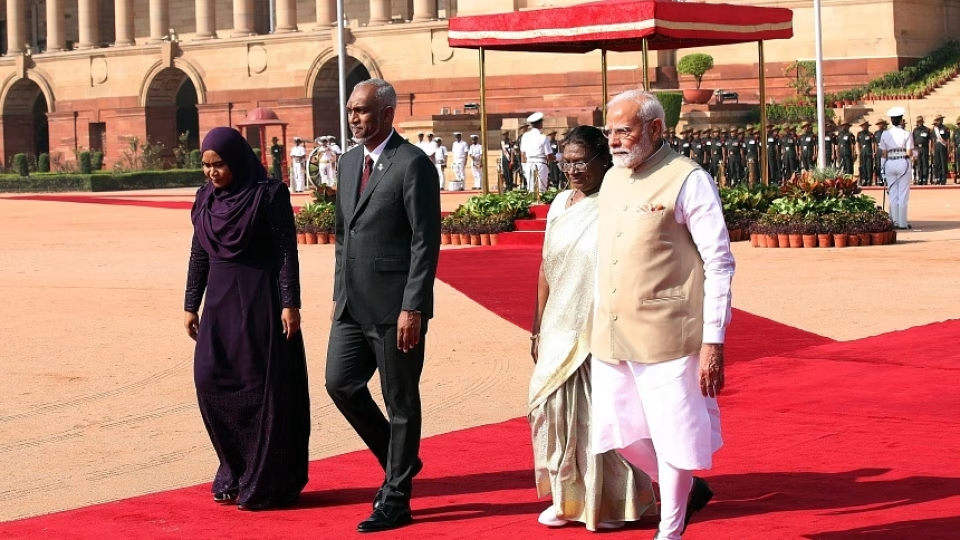October 8, 2024
NEW DELHI – Maldives President Mohamed Muizzu is in India to mend ties in a surprising reversal of an earlier anti-India position that underscores the depth of a festering financial crisis in the archipelagic state.
During talks between Dr Muizzu and Indian Prime Minister Narendra Modi on Oct 7, the two South Asian neighbours charted a fresh course on defence and economic cooperation.
Mr Modi said both countries concluded talks on a currency swap agreement of US$400 million (S$521 million) and 30 billion rupees (S$466 million) in a move that will improve Maldivian access to foreign currency.
Said Dr Muizzu at a joint press conference with Mr Modi after the talks: “We are fully committed to strengthening our cooperation with India across a broad spectrum of areas.”
He added that the currency swap agreement would be “instrumental in addressing forex issues right now”.
This development comes just weeks after ratings agencies Fitch and Moody’s downgraded the Maldives’ sovereign debt ratings. Fitch estimated on Aug 29 that the Maldives’ debt levels will further increase over the medium term from the estimated 109.4 per cent of its gross domestic product at the end of 2023.
Dr Muizzu’s visit also represents a marked departure from a year go, when he swept to power at elections in 2023 on an anti-India platform that favoured closer ties with China, a move which contrasted with his predecessor Ibrahim Solih’s pro-India policy.
The Maldives’ pivot towards India amid economic woes echoes that of Sri Lanka in 2022, when New Delhi played the role of a lender of last resort to the island state at a time when it faced deep economic crisis.
Like the Maldives, Sri Lanka had also built closer ties with China before its near economic collapse saw India coming to its rescue, once again deepening relations between the two South Asian neighbours and blunting Beijing’s influence in Colombo.
Indeed, analysts say India’s economic assistance to both Sri Lanka and the Maldives showed that the South Asian giant is the regional partner with the capabilities to help countries in the region navigate through hard times.
In the case of the Maldives, analysts say Dr Muizzu’s pivot away from India has been arrested by the hanging spectre of rising external debt and declining foreign exchange reserves.
“His visit underlined how ties with India remained crucial. This is a dramatic shift since (Dr Muizzu’s) ‘India out’ campaign,” noted Professor Srikanth Kondapalli from Jawaharlal Nehru University.
“Overall, definitely because of the debt-related problems that the Maldives is facing, he would be moving towards India. I think that is the main factor.”
India had similarly stepped in to help Sri Lanka with aid when it faced economic collapse.
India extended aid of US$4 billion in 2022 and played an active role in helping Sri Lanka during negotiations with the International Monetary Fund for a US$3 billion bailout.
Dr Muizzu had broken with tradition set by his predecessors when in 2023, following his electoral win, he did not visit India in his maiden overseas trip but went to Turkey instead.
He had also cancelled a hydrographic survey agreement with India, and pushed New Delhi to replace with civilians the 75 Indian military personnel in the Maldives to help operate helicopters that India had given to his country.
On Oct 7, that all changed.
Both leaders discussed a possible free trade agreement. India will also help the Maldives boost tourism, a key source of foreign exchange revenues.
“The relationship is historic and has been underpinned by close people-to-people relations,” said India’s Foreign Secretary Vikram Misri.
He said that Dr Muizzu’s visit had charted “new frontiers for engagement”, building on a “strong and extensive foundation of relations”.
India also agreed to help boost the surveillance and monitoring capability of the Maldives National Defence Force by providing radar systems and other equipment. India will also support the Maldives on matters related to hydrography or mapping of the ocean.
Said Mr Modi at the joint press conference on Oct 7: “Whether it was essential commodities, vaccines during Covid-19, or drinking water… we have acted as a good neighbour.”
He added: “India and the Maldives’ relations are centuries old. India is the Maldives’ nearest neighbour and close friend.”
Other Indian officials also underlined the importance of ties with the Maldives.
India is locked in a jostle for influence with China in the Maldives, which is strategically located in the Indian Ocean.
China, too, has extended help to the Maldives. China through its central bank recently announced a memorandum of understanding to promote “the settlement of current account transactions and direct investments in local currencies”, as well as facilitating smoother trade.
While concerns remain in New Delhi about Male’s relationship with Beijing, analysts said the visit showed that the Maldivian President would have to nurture ties with India.
“Even when Dr Muizzu was making all kinds of statements and decisions vis-a-vis India, India kept its cool, and I think that strategic patience seems to have brought the underlying balance in the India-Maldives relationship back,” said Professor Harsh V. Pant, vice-president for studies and foreign policy at the Observer Research Foundation, a New Delhi think-tank.
“I think India’s aid to Sri Lanka certainly seems to have also generated a sense in the region that at the end of the day, India as a regional partner, just as it stood with Sri Lanka, retains those capabilities to help countries navigate some more challenging times, and the Maldives seems to be passing through that challenging time economically,” he added.


